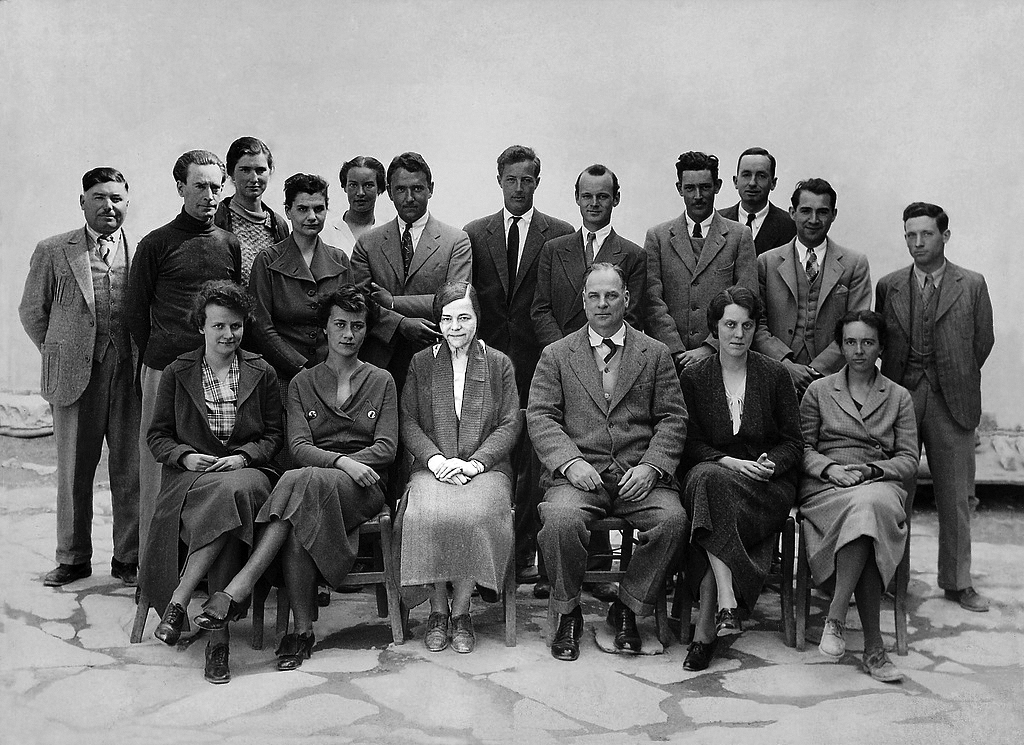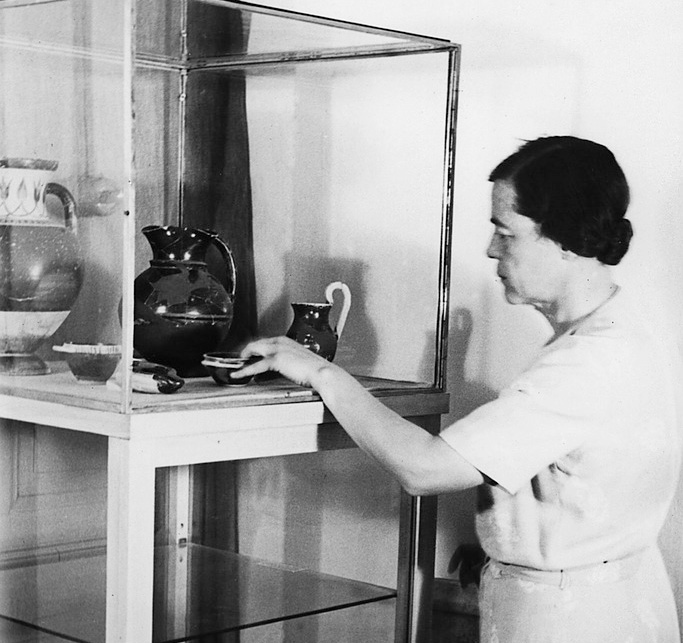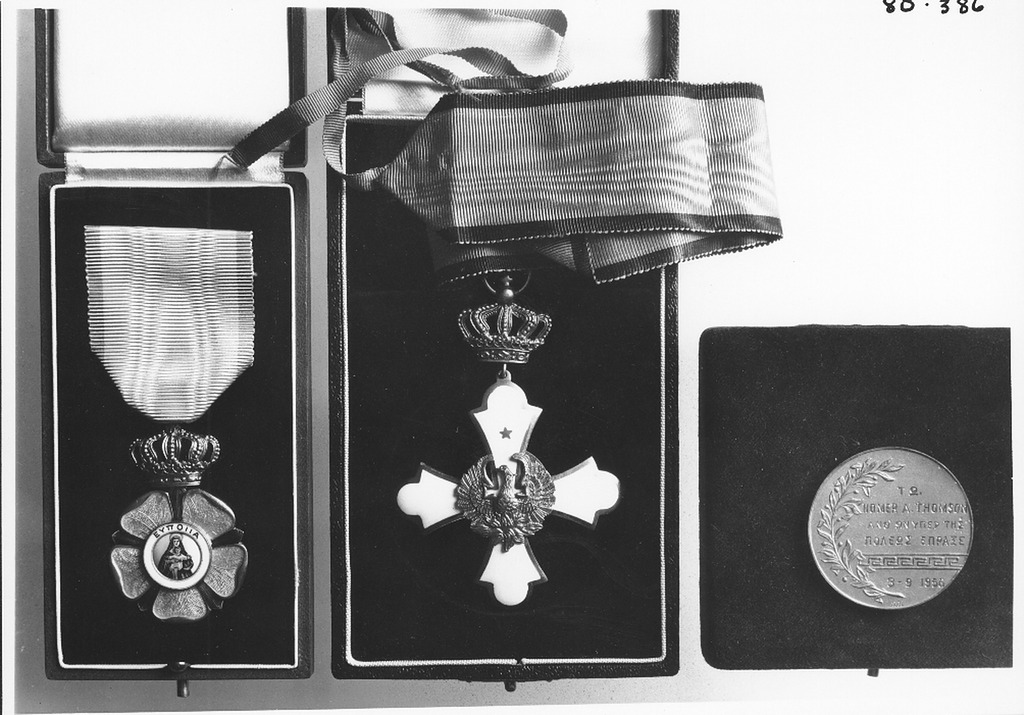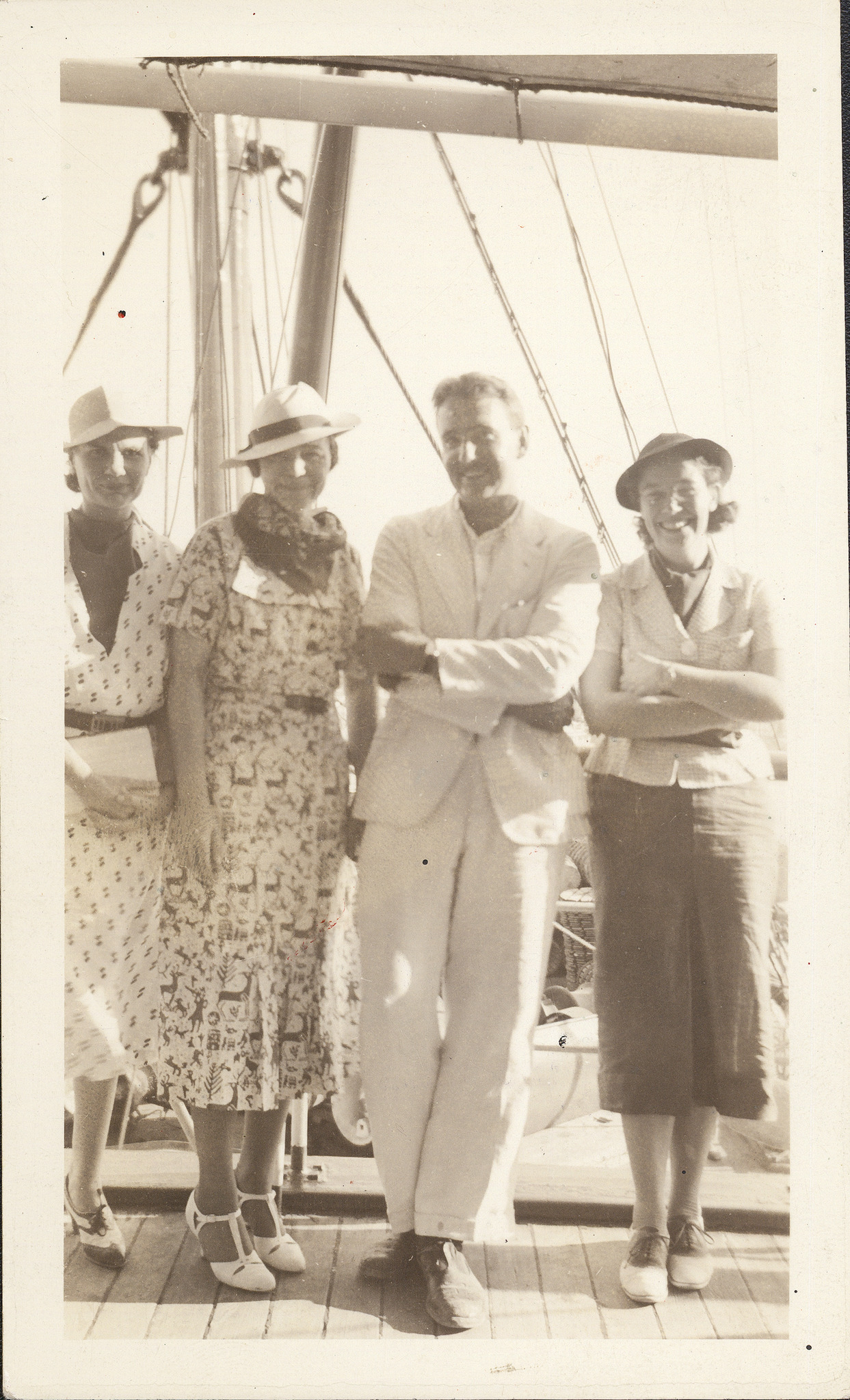
Agora Excavations staff 1934. Front row (left to right): Gladys Baker, Joan Bush [Vanderpool], Lucy Talcott, T. Leslie Shear, Josephine Shear, Dorothy Burr [Thompson]. Standing: Sophokles Lekkas, Piet de Jong, Catherine Bunnell, Alison Frantz, Dorothy Traq
Lucy Talcott Honored With Room in Loring Hall
The American School of Classical Studies at Athens is pleased to announce a room in Loring Hall in memory of Lucy Talcott, who was Secretary of the Agora Excavations from 1931 to 1958. The room, situated on the second floor of the Annex, is a gift from William T. (Rob) Loomis, President of the School’s Trustees.
Although Talcott did not hold a Ph.D. and had relatively few publications, she was one of the most influential archaeologists of the 20th century, partly because of her far-sighted design and organization of the records of the Agora Excavations and partly because of her Agora “blue book” on Athenian black and plain pottery (co-authored with Brian Sparkes), which has proven to be one of the most useful and widely consulted books at archaeological sites throughout the Mediterranean.

Lucy Talcott, photographed by Alison Frantz on Acrocorinth (ca. 1939)
In speaking of Talcott, Rob Loomis said, “Unfortunately, I never actually met Lucy Talcott, although we did exchange a number of letters when I sublet her Athens apartment in 1967/8. What I did not realize at the time, but came to learn later, was how immensely important she was for the Agora Excavations—the person who more than anyone else was responsible for organizing the excavation from the inside and keeping it humming for nearly 30 years. I also have been impressed that so many younger scholars, who barely knew her or never knew her at all, have come to feel a strong personal connection to her through the detailed records and correspondence that she left behind and the example that she set. When students walk into the Talcott Room and examine its scrapbook, I hope that they will get a sense not only of her achievement as an administrator and scholar, but also of her personality—her imagination and foresight, her meticulous attention to detail, her focus on the work rather than herself—and that they will be inspired to make their own contributions to our knowledge of ancient Greece.”
Emeritus Director of the Agora Excavations John McK. Camp II recalls that “Lucy had a mind like a computer before computers were invented. She was all about the organization and retrieval of information, which was her unique gift to the staff and every scholar visiting the site or the storerooms. The very high quality of the information was essential and closely reviewed by Lucy, who was always on the lookout for inconsistent or sloppy record-keeping. A Ph.D. oral exam was child’s play compared to a session with her to review one’s records. Fearfully, we all loved her.”

Lucy Talcott putting pots on display. P 18348 to the left. (ca. 1947)
Adding to the appreciation of Lucy Talcott's scholarly contributions, Kathleen M. Lynch, Professor of Classics at the University of Cincinnati, remarked, "Lucy Talcott was ahead of her time in many ways and established a scholarly foundation that continues to guide the study of Athenian pottery. As a scholar of Athenian pottery, I feel a great debt to Miss Talcott. She knew Athenian pottery of the Archaic and Classical period better than anyone since, but she also understood that pottery can inform more than chronology. She showed that it can tell us about everyday life in ancient Athens and about real Athenians, and, for all these reasons, she has inspired generations of scholars. ”
Susan I. Rotroff, Jarvis Thurston and Mona Van Duyn Professor Emerita at the Washington University in Saint Louis, emphasized Talcott's enduring impact: “Lucy Talcott created the beating heart of the Agora when she devised its recording system, which connects every object to its excavation context and hence to the ancient world it inhabited.”

Lucy Talcott received the Gold cross of the Order of Benetrice (at left), at the opening of the Stoa of Attalos
From the perspective of Aspasia Efstathiou, Associate Registrar at the Agora excavations, “Lucy Talcott was a prominent figure of the Agora excavations, whose work represents just what the Stoa of Attalos Research Center should be,” further stating, “Lucy's true commitment to her field, coupled with her eagerness and determination to assist others, stands as an exemplary model for those aspiring to traverse a similar path.”
Brian A. Sparkes, Emeritus Professor of Classical Archaeology at the University of Southampton and co-author of Agora XII: Black and Plain Pottery of the 6th, 5th and 4th Centuries B.C., provided historical context, stating, "Miss Lucy Talcott was one of the first women to be employed by the American School of Classical Studies for the excavation of the Athenian Agora. Her initial organization of the finds was exemplary and was retained throughout the excavation.” Sparkes praised her welcoming nature, affirming, “Her attitude to visitors, whether professionals, students, or sightseers, was always welcoming, in accordance with her natural disposition.”
These testimonials underscore the profound impact Lucy Talcott had on the world of archaeology and scholarship. The Talcott Room now stands as a testament to her enduring legacy, inviting future generations to explore, learn, and be inspired by her contributions to our understanding of ancient Greece.
To learn more about how to name a space in Loring Hall, please contact Nancy Savaides, Director of Stewardship and Engagement, at nsavaides@ascsa.org or 609-454-6810. Naming opportunities for a variety of spaces are still available. Donors can choose from a wide range of gift levels to name a room or area in honor of themselves, an American School scholar, or a family member, friend, or group.
Please click the links below to view the nameable spaces and options that remain:

Alison Frantz, Lucy Talcott, Rodney Young, Constance Curry in Attica, 1934-35 - Richard H Howland